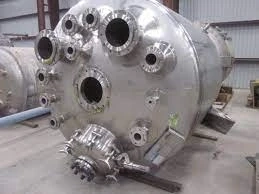In today's fast-paced world, sustainability has become a crucial aspect of every industry. The manufacturing sector, in particular, has made significant strides in adopting sustainable practices. One such advancement is the use of Hastelloy reactors, which have revolutionized sustainable manufacturing processes.
The Importance of Sustainable Manufacturing
Sustainable manufacturing is a concept that emphasizes the need for environmentally friendly and socially responsible production methods. With growing concerns about climate change and depleting natural resources, it is essential for industries to minimize their ecological footprint. By implementing sustainable practices, manufacturers can reduce waste, conserve energy, and contribute to a greener future.
Introducing Hastelloy Reactors
Hastelloy Reactors are a key innovation in sustainable manufacturing. These reactors are made from Hastelloy, a family of corrosion-resistant alloys known for their exceptional strength and durability. Hastelloy alloys are primarily composed of nickel, molybdenum, and chromium, which make them highly resistant to various corrosive environments.
Advantages of Hastelloy Reactors
Corrosion Resistance: Hastelloy reactors offer superior resistance to corrosion, making them ideal for handling corrosive chemicals and substances. This durability ensures a longer lifespan for the reactors, reducing the need for frequent replacements.
Enhanced Safety: Due to their excellent corrosion resistance, Hastelloy reactors provide a safer working environment. They minimize the risk of leaks or failures that could lead to accidents, ensuring the well-being of workers and preventing environmental contamination.
Versatility: Hastelloy reactors can be customized to suit different manufacturing processes. They can withstand high temperatures, extreme pressures, and aggressive chemicals, making them suitable for a wide range of industries such as chemical, pharmaceutical, and petrochemical.
Energy Efficiency: Sustainable manufacturing involves optimizing energy consumption. Hastelloy reactors, with their robust design and resistance to corrosion, contribute to energy efficiency by minimizing heat loss during processes. This reduces energy waste and operational costs.
Minimal Environmental Impact: By choosing Hastelloy reactors, manufacturers actively contribute to reducing their environmental impact. The use of these reactors ensures that harmful substances are contained, preventing them from entering the environment and causing pollution.
The Future of Sustainable Manufacturing
As the demand for sustainability continues to grow, the future of manufacturing lies in the adoption of innovative technologies and practices. Hastelloy Reactors represent a significant step forward in sustainable manufacturing, providing a reliable and eco-friendly solution for various industries.
Manufacturers worldwide are increasingly recognizing the importance of embracing sustainable practices. By investing in Hastelloy reactors and similar advancements, companies can position themselves as leaders in environmentally responsible manufacturing.
Conclusion
Hastelloy reactors have transformed the landscape of sustainable manufacturing. With their corrosion resistance, enhanced safety, versatility, energy efficiency, and minimal environmental impact, these reactors offer a viable solution for industries seeking sustainable production methods. By integrating these innovative reactors into their manufacturing processes, companies can not only reduce their ecological footprint but also pave the way for a greener and more sustainable world.


